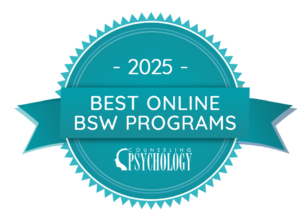Online Bachelor of Social Work (BSW) Degree

A Bachelor of Social Work (BSW) degree is an excellent choice for individuals passionate about positively impacting their communities. This degree pathway provides a solid foundation in social work principles and practices, preparing students for entry-level positions in various fields such as child welfare, healthcare, and community organizations. Pursuing a social work degree as a BSW may be the perfect pathway for you if you want to become a social worker to help others, advocate for social change, and improve the well-being of individuals and communities.
Can I Get a BSW Degree Online?
Absolutely! Online BSW programs have existed for many years but have become more popular since the Covid-19 pandemic. While many options exist, it’s always wise to consider an accredited program. Accreditation will allow you to become licensed and is routinely inspected by the accrediting body to ensure that the information delivered meets all of the necessary federal and state requirements. The US’s main social work accrediting body is the Council on Social Work Education (CSWE).
The second most important thing to look for is in-person requirements. While a program may be advertised as an online program, there may be unforeseen in-person requirements that students must fulfill, such as clinicals (though these are mostly reserved for MSW students). Check for terms like “100% online” or “fully online.” When in doubt, most schools welcome prospective students to talk to department heads for questions concerning the curriculum. If the program requires limited in-person participation instead of being entirely online, look at online programs in your state. If accepted as an in-state student, you will likely save on tuition costs.
2025 - Best Online Bachelor's in Social Work (BSW) Programs

Choosing the right social work program is an important step in preparing for a rewarding career in helping individuals, families, and communities. To assist students in finding the best options, we’ve compiled a list of the Best Online Bachelor’s in Social Work Programs based on factors like program flexibility, accreditation, affordability, and graduation rates. These programs offer the convenience of online learning while providing the rigorous education necessary to succeed in the field. For more details on how we evaluated these programs, visit our methodology page.
Georgian Court University
Georgian Court University’s Bachelor of Social Work (BSW) program prepares students for meaningful careers in social work through a comprehensive curriculum focused on social justice, ethics, and hands-on field experience. With small class sizes and personalized guidance, students gain the skills needed to advocate for individuals, families, and communities in need.
Millersville University of Pennsylvania
Millersville University’s Social Work Degree Completion Program is designed for students with prior college credits who want to complete their Bachelor of Social Work (BSW) degree. This flexible, online program combines academic coursework with field experience, preparing graduates for careers in social work and eligibility for advanced standing in MSW programs.
SUNY College at Plattsburgh
SUNY Plattsburgh’s online Bachelor of Social Work (BSW) program offers flexibility for students seeking to complete their degree while balancing other commitments. With a focus on social justice, ethical practice, and hands-on fieldwork, this program equips graduates with the skills and knowledge needed for impactful careers in social work or advanced graduate study.
Misericordia University
Misericordia University’s Bachelor of Social Work (BSW) program offers a comprehensive curriculum grounded in service, social justice, and hands-on experience. Students benefit from small class sizes, personalized attention, and field placements that prepare them for meaningful careers in social work. The program emphasizes ethical practice and advocacy for individuals, families, and communities.
The University of Tennessee-Knoxville
The University of Tennessee, Knoxville offers an online Bachelor of Science in Social Work (BSSW) program designed for students seeking flexibility without sacrificing academic rigor. This program focuses on social justice, ethics, and practical field experience, preparing graduates for diverse social work careers or advanced studies. Students gain essential skills to advocate for individuals, families, and communities.
Social Work Degrees at Every Level
Interested in a social work education? There's a degree for that! Check out the available campus-based and online social work degree options to get started.

What Can I Expect in an Online BSW Program?
In an online Bachelor of Social Work program, you can expect a comprehensive curriculum that covers foundational principles, theories, and practical skills necessary for a career in social work. Coursework typically includes subjects such as:
- Social welfare policy
- Human behavior and the social environment
- Research methods
- Diversity and cultural competence
- Social work practice methods
Through a combination of readings, lectures, discussions, and assignments, you will explore various theoretical frameworks and learn how to apply them to real-world scenarios. Above all, online BSW programs often offer flexibility in scheduling, allowing students to balance coursework with other commitments such as work or family responsibilities.
One significant aspect of an online BSW program is the integration of field education, which provides opportunities for hands-on experience in social work settings. Internships or practicums allow students to apply classroom knowledge to practice, develop professional skills, and gain insight into the challenges and rewards of working in the field. For online students, many of these opportunities can be taken advantage of in their communities.
Online BSW Degree Admission Requirements
Admission requirements for BSW degrees vary depending on the institution offering the program. However, there are standard criteria that applicants can expect to encounter across most universities and colleges. Typically, prospective students are required to have:
- A high school diploma or GED
- Transcripts that meet the minimum GPA requirements
- SAT or ACT scores
- A written essay or statement of purpose
- Medical records
Many BSW programs assess applicants based on their academic qualifications, personal qualities, commitment to social justice, and relevant experiences, such as volunteer work or internships in social service settings. Letters of recommendation, personal statements, and interviews may also be part of the application process, allowing candidates to articulate their motivation for pursuing a career in social work and their suitability for the program. Some institutions may have specific prerequisites or coursework requirements, such as prior completion of particular social science or psychology courses.
BSW Program Length
A BSW degree typically takes four years to complete, although program length can vary depending on factors such as enrollment status and credit transfers. Approximately 120 credit hours will be required. Many online BSWs allow students to complete the program part-time or at their own pace, which can considerably increase or decrease the length of time.
BSW Program Cost
The cost of a Bachelor of Social Work (BSW) program can vary widely depending on factors such as the type of institution (public or private), the school’s location, and whether the student is an in-state or out-of-state resident. On average, tuition for a BSW program at a public institution can range from $7,000 to $20,000 per year for in-state residents and $15,000 to $30,000 per year for out-of-state residents. Tuition at private institutions is typically higher, ranging from $20,000 to $50,000 per year.
Additionally, students should budget for additional costs such as books, supplies, and fees, which can add several thousand dollars to the program’s overall cost.
Licensing & Practice as a BSW Graduate
Check your state’s social work licensing board for more information on what type of licensing and/or practice you can pursue as a BSW graduate. Each state has different guidelines on what education level is needed for certain social work roles. Some states allow BSW graduates to practice under supervision. Still, in many states, you must go on to earn a Master of Social Work (MSW) degree at minimum for licensed clinical roles and to work independently.
BSW Degree Specialties
Behind every sector is an opportunity for social workers to bring a humane and specialized approach to operations, management, or service. When we think about social workers, we usually associate them with community-oriented settings such as homeless shelters or social services. But in reality, there is a wide range of social work career specializations, including:
- Administrative Social Workers
- Court Social Workers
- Healthcare Social Workers
- Child Welfare Social Workers
- Disability Social Workers
While BSW degrees don’t tend to offer formal specializations, research the curriculum of programs you are considering to make sure the coursework addresses areas you might be interested in. You can also opt for any available electives that may deepen your knowledge in a specialty area. To specialize further, consider continuing your education with a Master of Social Work (MSW) or even a Doctorate of Social Work (DSW).
The other great thing about completing a BSW is that it will put you in a great position to enroll in an Advanced-Standing MSW degree program if you wish to pursue more education in the social workspace. Advanced-Standing MSW programs can be completed in about half the time of a traditional MSW, but you must complete a BSW with a GPA of at least 3.5 to be eligible for this accelerated option.





